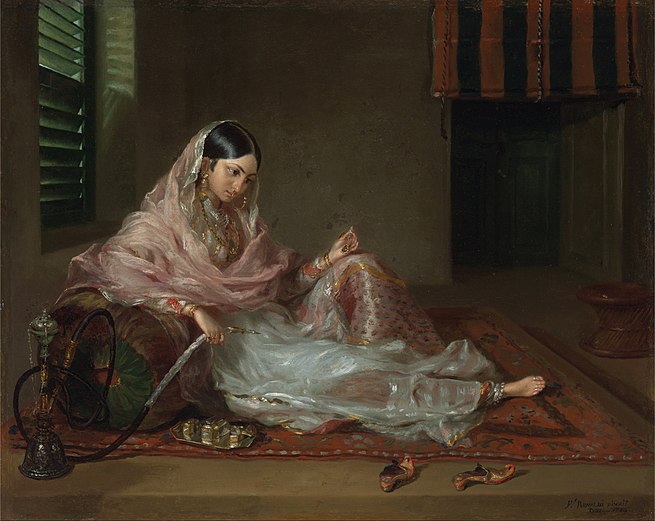
Main Difference
The main difference between Muslin and Linen is that the Muslin is a cotton fabric of plain weave of Bangladesh and Linen is a textile made from spun flax fiber.
-
Muslin
Muslin ( or ), also mousseline or Malmal, is a cotton fabric of plain weave. It is made in a wide range of weights from delicate sheers to coarse sheeting. Muslins were imported into Europe from the Bengal region, in the eastern part of the Indian subcontinent, during much of the 17th and 18th centuries and were later manufactured in Scotland and England. While English-speakers call it muslin because Europeans believed it originated in the Iraqi city of Mosul, its origins are now thought to have been farther east — in particular Dhaka, the capital of what is now Bangladesh. Dhaka’s jamdani muslin, with its distinctive patterns woven in layer by layer, was one of the Mughal Empire’s most prestigious and lucrative exports. Early muslin was handwoven of uncommonly delicate handspun yarn.In 2013, the traditional art of weaving Jamdani muslin in Bangladesh was included in the list of Masterpieces of the Oral and Intangible Heritage of Humanity by UNESCO.
-
Linen
Linen is a textile made from the fibers of the flax plant. Linen is laborious to manufacture, but the fiber is very strong, absorbent and dries faster than cotton. Garments made of linen are valued for their exceptional coolness and freshness in hot and humid weather.
The word linen is of West Germanic origin and cognate to the Latin name for the flax plant, linum, and the earlier Greek λινόν (linón). This word history has given rise to a number of other terms in English, most notably line, from the use of a linen (flax) thread to determine a straight line. Many products are made of linen: aprons, bags, towels (swimming, bath, beach, body and wash towels), napkins, bed linens, tablecloths, runners, chair covers, and men’s and women’s wear.
The collective term “linens” is still often used generically to describe a class of woven or knitted bed, bath, table and kitchen textiles traditionally made of flax-based linen but today made from a variety of fibers. The term “linens” refers to lightweight undergarments such as shirts, chemises, waist-shirts, lingerie (a cognate with linen), and detachable shirt collars and cuffs, all of which were historically made almost exclusively out of linen. The inner layer of fine composite cloth garments (as for example dress jackets) was traditionally made of linen, hence the word lining.Textiles in a linen weave texture, even when made of cotton, hemp, or other non-flax fibers, are also loosely referred to as “linen”. Such fabrics frequently have their own specific names: for example fine cotton yarn in a linen-style weave may be called madapolam.
Linen textiles appear to be some of the oldest in the world: their history goes back many thousands of years. Fragments of straw, seeds, fibers, yarns, and various types of fabrics dating to about 8000 BC have been found in Swiss lake dwellings. Dyed flax fibers found in a prehistoric cave in Georgia suggest the use of woven linen fabrics from wild flax may date back even earlier to 36,000 BP.Linen was sometimes used as a form of currency in ancient Egypt. Egyptian mummies were wrapped in linen as a symbol of light and purity, and as a display of wealth. Some of these fabrics, woven from hand-spun yarns, were very fine for their day, but are coarse compared to modern linen. In 1923, the German city Bielefeld issued banknotes printed on linen.
Today, linen is usually an expensive textile produced in relatively small quantities. It has a long staple (individual fiber length) relative to cotton and other natural fibers.
-
Muslin (noun)
Any of several varieties of thin cotton cloth.
-
Muslin (noun)
Fabric made of cotton, flax (linen), hemp, or silk, finely or coarsely woven.
-
Muslin (noun)
Any of a wide variety of tightly-woven thin fabrics, especially those used for bedlinen.
-
Muslin (noun)
Woven cotton or linen fabrics, especially when used for items other than garments.
-
Muslin (noun)
A dressmaker’s pattern made from inexpensive cloth for fitting.
-
Muslin (noun)
Any of several different moths.
-
Linen (noun)
Thread or cloth made from flax fiber.
-
Linen (noun)
Domestic textiles, such as tablecloths, bedding, towels, underclothes, etc., that are made of linen or linen-like fabrics of cotton or other fibers; linens.
“She put the freshly cleaned linens into the linen closet.”
-
Linen (noun)
A light beige colour, like that of linen cloth undyed.
“color panel|FAF0E6”
-
Linen (adjective)
Made from linen cloth or thread.
-
Linen (adjective)
Having the colour linen, light beige.
-
Muslin (noun)
lightweight cotton cloth in a plain weave
“she folded the dress in layers of clean muslin”
“strain the fruit pulp through a muslin cloth”
-
Muslin (noun)
a hemmed square of lightweight cotton cloth used to wipe up regurgitated milk when feeding or winding a baby
“I’m surrounded by piles of nappies and muslins”
-
Linen (noun)
cloth woven from flax
“a linen suit”
“he dealt in Irish linens”
-
Linen (noun)
articles such as sheets or clothes made, or originally made, of linen
“the linen cupboard”
